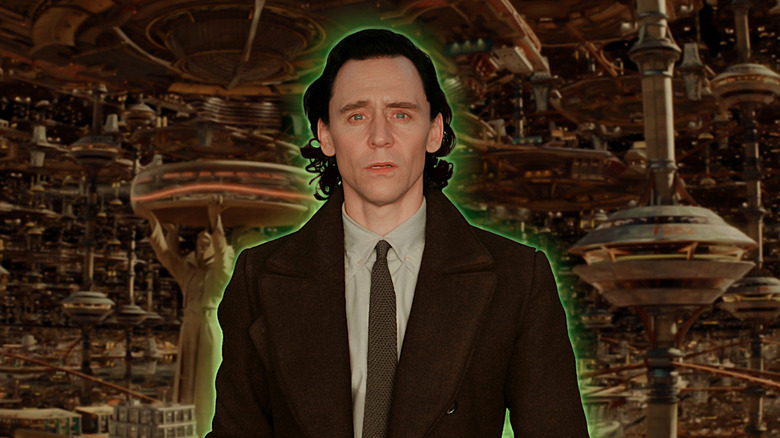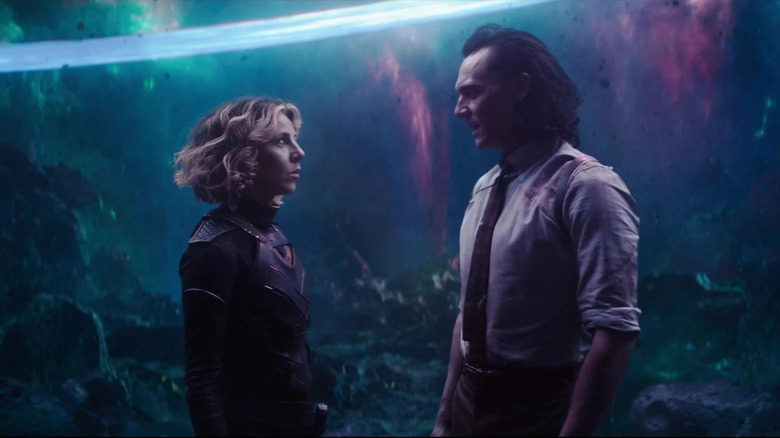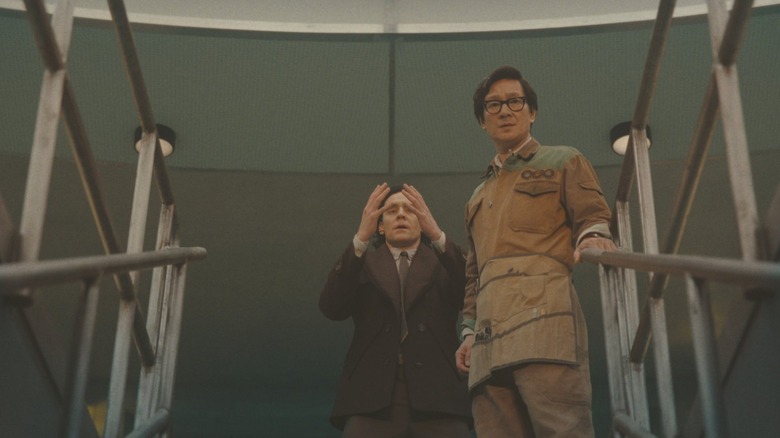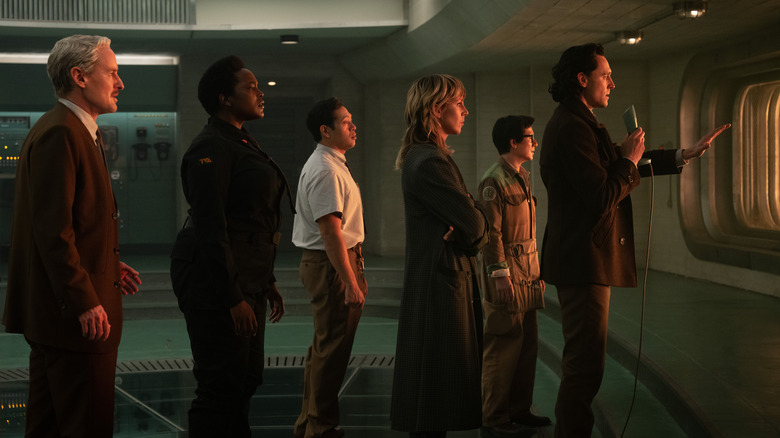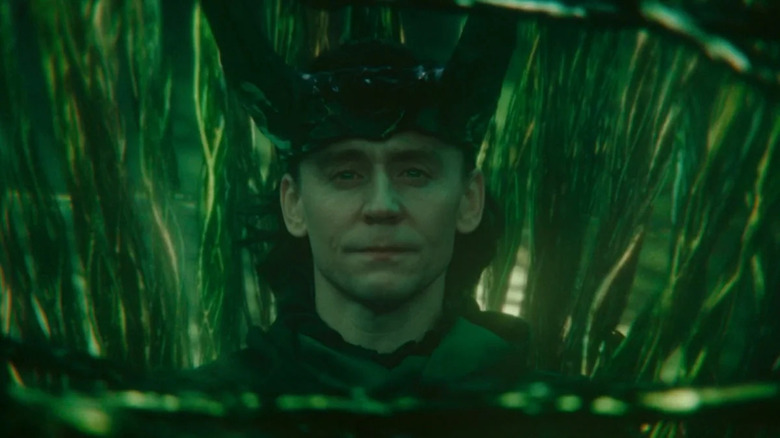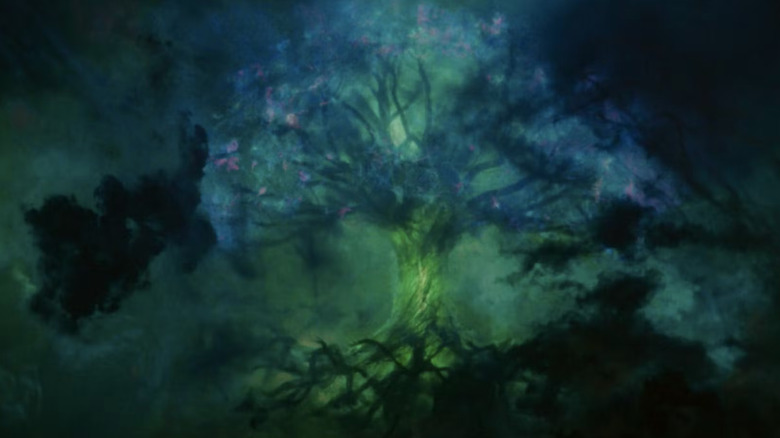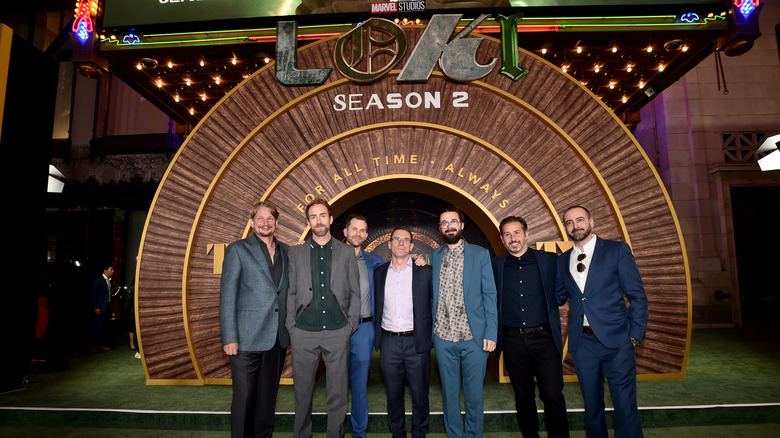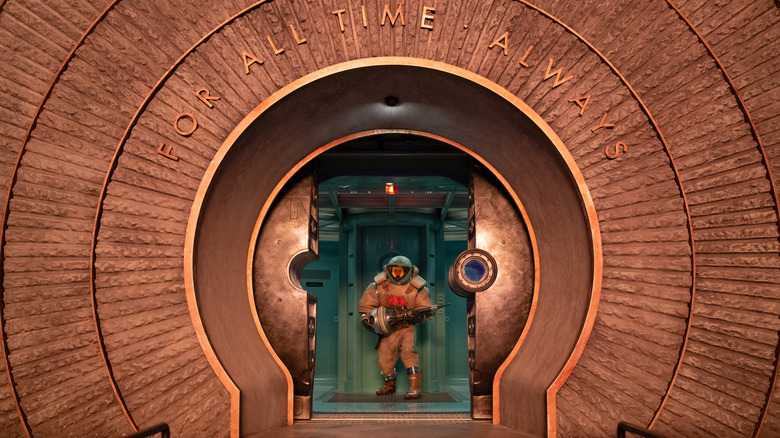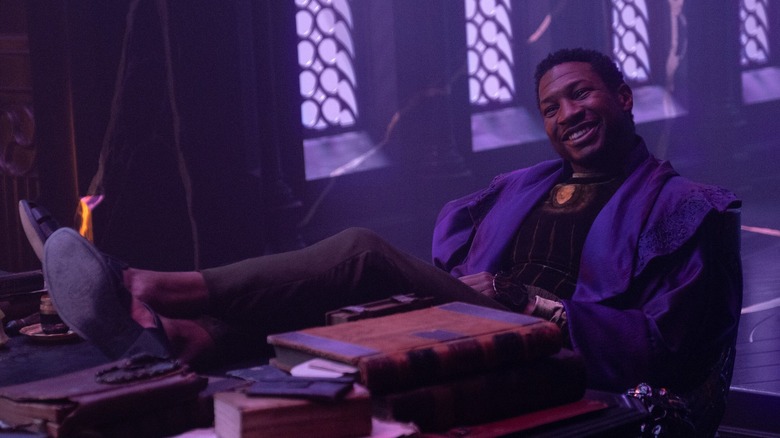The Ending Of Loki Season 2 Explained
Contains spoilers for "Loki" Season 2, Episode 6
With its diverging timelines and looping paradoxes, the Disney+ series "Loki" has established an identity for itself as possibly the most complicated story within the Marvel Cinematic Universe. The latest adventures of the titular trickster god as he works for and against the Time Variance Authority (TVA) serve as Marvel Studios' answer to "Doctor Who." The show has laid the groundwork for the MCU's Multiverse Saga, while still existing as its own independent story in its own little weird corner of the universe and existing outside the normal workings of time.
Where Season 1 left off on a huge cliffhanger, Season 2 brings everything full circle in more ways than one. Let's recap how the season finale — quite likely the series finale — brought the story to a close, before delving into some analysis on what the ending means, both in its own thematic terms and in its implications for the larger MCU.
What you need to remember about the plot of Loki Season 1
The "Loki" series first picks up from the moment in "Avengers: Endgame" where Loki (Tom Hiddleston) steals the Time Stone and escapes from the Battle of New York. For breaking the "Sacred Timeline," he's taken in by the TVA, an organization that works to prune unstable timelines. After being caught up by Agent Mobius (Owen Wilson) on how his life is supposed to go and realizing he can't possibly escape, Loki agrees to go on a mission across time and space to hunt down Sylvie (Sophia Di Martino), a female variant of himself from another branching reality.
Yet Loki develops sympathy — and romantic feelings — for Sylvie, and together they decide to fight against the TVA in defense of their own right to exist. The Time-Keepers, who supposedly founded the TVA, turn out to be androids, a ruse meant to hide the organization's real creator. Traveling to the Void at the End of Time — and getting help from some other Loki variants in fighting off TVA agents — Loki and Sylvie track down the true founder, known as He Who Remains (Jonathan Majors). This variant of Kang the Conqueror formed the TVA after winning a multiversal war against other versions of himself, and has them maintain the Sacred Timeline in order to prevent other Kangs from returning. Sylvie sends Loki back to the TVA and kills He Who Remains, allowing the multiverse to spring into existence.
What you need to remember about the plot of Loki Season 2
Season 2 of "Loki" begins right where Season 1 left off, with Loki now slipping back and forth in time, a problem that TVA handbook author Ouroboros (Ke Huy Quan) suggests is the result of the branching timelines. Mobius fixes this issue by pulling Loki from the timestream, but not before Loki witnesses the total destruction of the TVA at the hands of an overloaded Temporal Loom.
Loki finds himself at odds with Sylvie, now working in a McDonalds, over what to do about the coming disaster. She seeks to kill Victor Timely, an earlier Kang variant whom rogue agent Ravonna Renslayer (Gugu Mbatha-Raw) and animated AI Miss Minutes (Tara Strong) are trying to send on his path to forming the TVA. Loki ultimately stops Sylvie from killing Timely, and together they all embark on a complex mission to expand the Temporal Loom with a Throughput Multiplier. The mission fails, with Timely turned into spaghetti from the radiation and the Loom exploding.
Mobius, Ouroboros, Hunter B-15 (Wunmi Mosaku), and Casey (Eugene Cordero) get sent back to their original pre-TVA lives, while Loki is left timeslipping again. Loki seeks help from the pre-TVA Ouroboros, a scientist and science fiction author known as A.D. Doug, who is able to redevelop TempPad technology using the handbook his future self would write. Reuniting his friends, Loki is ultimately able to control the timeslipping by focusing on the "why" of what he's seeking to do, and not the "how."
What happened at the end of Loki Season 2?
In the "Loki" Season 2 finale, "Glorious Purpose," Loki uses his newfound control of timeslipping to repeatedly relive the attempt to expand the Loom with the Throughput Multiplier. After spending literal centuries studying the mechanics of it, he is eventually able to help Victor Timely safely launch the Multiplier. Unfortunately, even this doesn't fix the Temporal Loom, as the timelines keep growing at an infinite rate beyond what any Multiplier could handle.
Loki travels back to his fight with Sylvie at the End of Time from the Season 1 finale, "For All Time, Always." After several repeats of this loop, He Who Remains freezes time to tell Loki what's actually going to happen: the Loom is a failsafe, the destruction of which will end up reverting everything to the Sacred Timeline anyway. The only way to stop this would be to kill Sylvie, which Loki does not want to do.
Loki slips back in time to his first meeting with Mobius, asking him for advice, and then into the ending of Season 2, Episode 5, "Science/Fiction," where Loki has now learned how to freeze time and has one last heart-to-heart with Sylvie before completing his ultimate plan: to destroy the Temporal Loom himself, then use his magic to revive all the branches. Loki becomes the God of Stories, reshaping the flow of time into a tree. The TVA is reformed to protect that tree, and Loki's friends are free to either continue working there or return to their prior lives — while his enemy Renslayer appears trapped in the Void at the End of Time, facing a glowing purple light in her final scene.
What the ending of Loki Season 2 means
It's no coincidence that the "Loki" Season 2 finale has the same title as the Season 1 premiere: "Glorious Purpose." Such repeating loops are part and parcel of the "Loki" experience — this is a show with characters named Mobius and Ouroboros, after all — but it also serves as a statement of intent for what the show is ultimately about: Loki claiming a new sense of purpose.
In this finale, Loki is able to save the day by embracing his full god-like power. He's able to reconcile Sylvie's desire for free will and the TVA's desire for safety in a manner that no one else would be able to. It's a far cry from both the villain Loki was in "The Avengers" and from the relatively restrained agent he's been for much of his Disney+ series.
Yet in his big act of heroism there's still an element of the chaos that's always been a part of him. His timeslipping ability is itself supposed to be "impossible," and yet he does it anyway. He uses it to spend hundreds of years learning how time works, and when the answers don't work for him, he answers "no, thank you," and instead changes the rules to preserve a multiverse as varied and multifaceted as he is and finding true glorious purpose in the process.
A return to Loki's Norse mythological roots
For much of "Loki" Season 2, the mythological aspects of the main character have been backgrounded in favor of navigating the science fiction paradoxes of the TVA. Loki's status as a god is only passingly referenced, with those references playing as reminders of something that almost seems forgotten. This all changes with the finale, where Loki literally sheds his TVA uniform in favor of a new version of his classic green costume as he takes on new responsibilities to the multiverse.
The choice to rework the Temporal Loom into a tree is a particular callback to Loki's origins in Norse mythology, resembling the classic conception of Yggdrasil, the sacred tree that connects the Nine Realms. Loki's tree might not be Yggdrasil itself, which has been presented in other Marvel films as less a literal tree and more a cosmic nebula, but the story here is clearly working with a similar concept.
What did Mobius choose?
Loki's sacrifice has brought genuine free will to the world, and now the TVA members previously working for the organization under duress have choices to make about their futures. B-15, Casey, and Ouroboros are staying at the TVA, while Sylvie is getting as far away as she can, uncertain what the future holds for her but knowing that she can finally be free. Seemingly caught between these two inclinations is Mobius, whose ultimate decision is left ambiguous.
When we last see Mobius, he's looking at his other self and his family in one of the timelines. Talking to Sylvie at that moment, he says he's going to wait a while and "let time pass." This could mean he's on a hiatus from his TVA job, or it could mean he's going to quit it. What he ultimately decides will probably be revealed the next time the TVA shows up in the MCU, but at this point, what he decides doesn't matter so much as the fact that he's able to make a decision.
What has the cast and crew of Loki Season 2 said about the ending?
Due to the SAG-AFTRA strike, which ended the same day that the "Loki" Season 2 finale premiered on Disney+, cast interviews have been nonexistent for this season. Most of the press for the season, as such, has been handled by writer Eric Martin and executive producer Kevin Wright.
Speaking to Marvel's official website, Wright spoke about how the show came up with its thrilling ending: by moving up other potential ideas for the finale even earlier in the season. "What we always like to do in all of the scripts, and in all of our storytelling," he said, "is that thing you think is going to happen in Episode 6, or could happen in the finale or towards the end, what happens if we move that forward? What if we just accelerate all of the storytelling, hit it early." He praised the final two episodes of the season, calling them "beautiful ... profound ... [and] deeply moving."
Wright also confirmed to Deadline that the finale wouldn't be another cliffhanger like Season 1, saying, "We want to be able to deliver real fulfillment in what we're doing, but I do think it'll be exciting and unexpected and everything people like about this show." Martin, meanwhile, clarified to ScreenRant that there was no pressure to set up any other Marvel stories, saying, "There weren't conversations about we had to do this or that. It was just like, earn this. Do a great job."
What the end of Loki Season 2 could mean for the franchise
The ending of "Loki" Season 2 isn't so much a game-changer for the MCU as it is a game-stabilizer. There's nothing as dramatic in its implications here as the creation of the multiverse at the end of "Loki" Season 1. Having Loki save and preserve the multiverse allows the current status quo of the multiverse-focused Phases 4 and 5 to continue without any immediate threat of timeline collapse — though there will surely be other threats to the way the multiverse is operating by the end of Phase 6 and the arrival of "Avengers: Secret Wars."
The most immediate follow-through on the series' plot will likely be seen in "Deadpool 3," with rumors swirling around that the TVA is going to get involved in Deadpool and Wolverine's universe-hopping adventure. It would be a logical place to include the TVA, who have been confirmed to be seen again in the MCU at some point. Loki himself would make sense to appear in the fifth "Thor" movie rumored to be in development — we can only imagine it being a very strange family reunion with his adoptive brother. And of course, Kang the Conqueror is still being set up to be a major player in the future of the MCU, though whether Marvel goes through with that set-up is an entirely separate conversation.
What's going on with He Who Remains/Kang the Conqueror?
When Jonathan Majors first showed up as He Who Remains in "Loki" Season 1, it seemed as if we were getting the next Thanos-level supervillain. This was exciting at the time due to Majors' acting talent. It's a lot less exciting now, in light of Majors' legal troubles and allegations of violent and abusive behavior — including at least one incident in London during the filming of "Loki" Season 2.
Season 2 was clearly meant to continue building up Kang as the franchise's big antagonist, showcasing a very different sort of variant in the form of Victor Timely. That glowing purple light in front of Renslayer in her final scene is ambiguous: some believe it to be the cloud monster Alioth, but others have read it as an indication of yet another Kang variant appearing.
Because of this ambiguity over the source of the purple light, Marvel Studios has an easy out: they can either recast the role of Kang with a different actor or phase out the character entirely, as has been a rumored possibility. The questions with Victor Timely and the paradox of the TVA Guidebook can just as easily remain unanswered mysteries. Furthermore, if the studio does phase out Kang, there's another narrative out built up in the "Loki" finale: the newly reformed TVA might just be so effective at tracking and defeating Kang variants that he's no longer an issue for other heroes to worry about.
Will there be a Loki Season 3?
There will almost certainly not be a Season 3 of "Loki," and if there is, it will not be in the same form that the first two seasons took. Loki has now become an all-seeing tree, which would make for a pretty boring show. Even if this new responsibility of his is ultimately short-lived, it would be hard to imagine Loki going back to the TVA after this. That would be a needlessly repetitive and forced excuse to continue a popular streaming series long after its story has already come to its natural conclusion — which feels all the more conclusive due to the lack of any post-credits teasers.
Kevin Wright confirmed to Deadline that any future continuation of Loki's story would have to be something very different: "We take it season by season, and there are certainly things that Tom and I ... have talked about of where we see this going, and I know there's some excitement for that internally, but just from a storytelling standpoint, I think we always conceived of Seasons 1 and 2 as a whole. That these are two chapters of the same book, and that Season 2 is finishing that book ... there are other stories to be told there, but I think they would be new books, if that's not too coy."
